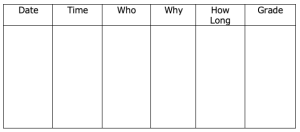[toc]
The Impact of Interruptions
One thing that gets in the way of effective time management is interruptions. Whether these interruptions come in the form of people approaching your desk, a phone call or email, they all prevent us from managing our time and getting things done.
Interruptions can be frustrating, and we often waste a lot of time dealing with them.
There is a lot of ideas out there on how to deal with interruptions, but before you can get to deal with them, it’s a good idea to find out where they are coming from and why.
A neat tool to do this is and to find out who your persistent offenders are to is an interruptions log.
An interruptions log is a piece of work you can complete over the space of several days where you make a note of each time you are interrupted. Here is how it works.
How to Create an Interruptions Log
Create a template with the following headings:
Date, time, who, why and grade. It might look something like this:

- Date – The date the interruption happened (this could just be written at the start of the day)
- Time – The time the interruption happened
- Who – Who interrupted you?
- Why – Why did they interrupt you?
- How long – How long did the interruption last for?
- Grade – Grade the interruption to its importance. If the interruption was very necessary, then grade it as A up to if the interruption was completely irrelevant, then grade it as D. Mark other interruptions in between.
Analysing the Interruptions Log Data
Do this for around a week then analyse the data. Look for trends and also look at how much time you have spent dealing with interruptions.
For example:
Do you find that you are being interrupted by the same person? If so, it may suggest that this persona has become reliant on you for information. It could also suggest that you are making it too easy for them to ask you. Try pushing back, asking them what they think they should/could do or make sure they understand how to do the things they are asking for themselves.
Do you find that different people are interrupting you for the same reason? This may suggest that a training need exists which could be addressed, or that you hold some information that others need access to that could be made publically available.
The times of day that you are interrupted can also be a useful signal to look at too. For example, if you get interrupted more in the morning than in the afternoon or vice-versa, this could suggest that people have less energy at those times in the day and find it easier to ask you questions. It could also mean that you lack energy around those times, and you find it easier to just answer peoples questions.
Use the data to proactively put fixes in place to reduce or remove as many interruptions as you can. This will go a long way to help you with your time management and to get more things done.
Time Management Training Course
Our time management training course looks at the interruptions log and many more things that you could do to better manage your time.



